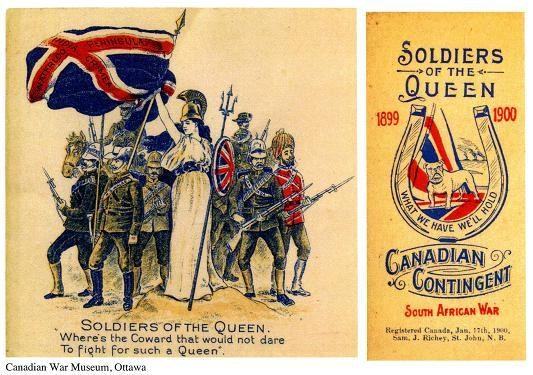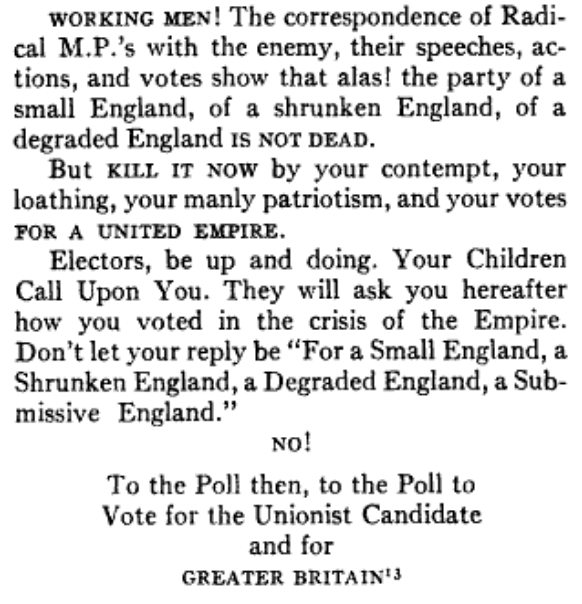Why the phrase “Little Englanders” explains everything about Brexit, and holds the key to healing the bitter divisions it has unleashed.
Thread. 1/x
Thread. 1/x
No phrase in British politics is more loaded than “Little Englanders”. It’s become a standard term of abuse directed at Brexiteers who are accused of ‘English nationalism’, ‘xenophobia’, or worse, but it is the people who use it who have the most thinking to do… 2/x
To understand the origins of the term, we need to go back to the late 19th century and the British Empire’s attempt to assert its hegemony in Southern Africa in a war against the two independent Boer republics descended from Dutch settlers. 3/x
When war broke out in 1899, the British thought it would be over by Christmas, but in the second week of December they suffered a series of defeats by the Boers in what became known as the British Army’s black week. 4/x
The war was controversial and split opinion, particularly among the Liberals who had already seen the formation of the breakaway Liberal Unionists, who opposed Home Rule for Ireland and went into a Unionist coalition government with the Conservatives. 5/x
Opinion was also split in what was known as “Greater Britain”, but with the prestige of the Empire seen as being at stake, Canada, Australia and New Zealand all sent troops to fight the Boers. 6/x
The following year, it looked like the British had turned the tide after occupying the capitals of Bloemfontein and Pretoria. The Unionist coalition government called a General Election which became known as the khaki election, after the colour of the Army’s new uniforms. 7/x
Opponents of the Boer War were denounced as “Little Englanders” and voters were urged to show their “manly patriotism” by backing the government and voting for a “United Empire”. 8/x
In fact, the war was very far from over as the Boers adopted guerrilla tactics, which the British countered with a scorched earth policy, burning farms and rounding up Boer women and children as well as natives into concentration camps. 9/x
When campaigner Emily Hobhouse exposed the shameful situation and huge death toll in the camps, she was met with accusations of being a traitor, and in the febrile atmosphere of the time, many didn’t want face the truth. 10/x
After the war, the epithet “Little Englander” continued to be a byword for a lack of commitment to the Empire. The Secretary of State for War was chided as a “Little Englander” in parliament for failing to fly the Union Jack outside the War Office on Empire Day. 11/x
The term then largely fell out of use until the 1990s, when Englishness became associated with Euroscepticism and right-wing opposition to Tony Blair’s ‘New Labour, New Britain’ project. 12/x
Superficially, it looks as though the meaning of “Little Englander” has been inverted, but beneath the surface, there are more similarities than it might first appear. 13/x
Tony Blair’s case for EU membership was largely based on British exceptionalism. Blair wanted to make Britain “great again”, and argued: “Once we could project our global role through our empire. Now we should exercise it through Europe.” 14/x https://twitter.com/EnglandInEurope/status/1258903798434729984">https://twitter.com/EnglandIn...
This explains the exasperation of Brexiteers who felt that the case for the EU was not being made honestly in the UK. They could see the disconnect between the way the British elite talked about the project and the reality. 15/x
Seen in this light, the ostensibly pro-EU position of Blair and Cameron looks less like a genuine embrace of European integration and the ideals represented by the EU, and more like a rearguard attempt to cling on to a particular sense of British grandeur and special status. 16/x
The “Little Englander” insult, however, took on a new twist. Whereas a century ago, “Little Englander” was meant as an accusation of a lack of patriotism, in the context of an asymmetrically-devolved British union, it became a way to delegitimise English political identity. 17/x
In 2017, the then Danish Finance Minister @Kristian_Jensen remarked: “There are two kinds of European nations. There are small nations and those nations that have not yet realised they are small nations.” 18/x
Who is most in need of heeding that lesson? The “Little Englander”, or the person who thinks that England must cling on to the remaining parts of its own imperial union in order to be great? 19/x
Over the course of the last few centuries, many Western European nations journeyed from being global empires back to being European states. If England’s imperial story is to conclude the same way, we need to stop being ashamed of being ‘little’ England. 20/20

 Read on Twitter
Read on Twitter



